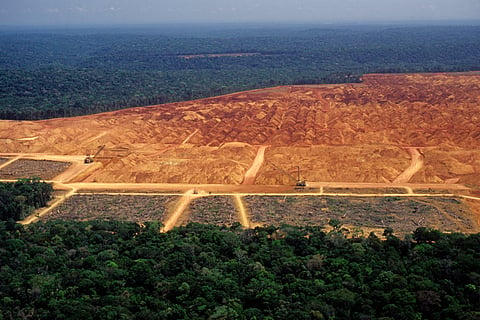

The Amazon forests and the forest-dwelling indigenous communities are facing an existential threat in Ecuador. This threat is attributed to organised crime, illegal mining and the government’s counter-measures that wreak havoc on one of the richest hotspots of biodiversity on earth, according to a recent report.
“Ecuador has become one of the most violent countries in the world and last year its Amazonian regions experienced the largest increase in murder rates,” a report published by Amazon Watch, a US-based non-profit organisation has mentioned.
The report Gold, Gangs, and Governance: Indigenous Communities in the Grip of Organized Crime highlighted how criminal networks have entrenched themselves in the Ecuadorian Amazon, turning it into a hotbed of illegal activities that devastate the environment and violate the rights of Indigenous peoples.
“With the government’s repressive policies failing to address the root causes of violence and the expansion of illicit markets, Amazon Watch and Indigenous organisations are calling for urgent international attention and intervention,” it appealed.
The report underlined that the Ecuadorian government exhibits glaring institutional weakness and an alarming inability to control illegal mining activities in the Amazon.
“Amazonian Indigenous communities face a triple threat: The militarisation of the state in response to our resistance against extractive projects, the relentless advance of illegal gold mining and organised crime, which brings violence, contract killings and extortion into our territories,” Zenaida Yasacama, vice-president of the Confederation of Indigenous Nationalities of Ecuador, was quoted in a press statement issued by Amazon Watch on September 11.
“Government strategies, based on heavy-handed policies, have failed to curb organised crime; on the contrary, they have intensified human rights violations, including extrajudicial executions, forced disappearances and arbitrary detentions,” she added.
The press statement mentioned that the Ecuadorian government’s failure in containing the crisis is evident in the lack of traceability for exported gold, the proliferation of shell companies and the disturbing complicity of authorities in these illicit operations.
“Despite the devastating environmental impacts — ranging from massive deforestation and water contamination to the destruction of critical ecosystems — the government's security plans have been woefully inadequate,” it argued.
“They lack targeted measures to protect vulnerable Indigenous communities and fail to address the environmental crimes that are wreaking havoc on this vital region,” the statement added.
The report outlined that Amazonian Indigenous communities, such as the Cofán, Kichwa and Shuar, are on the frontlines of this crisis.
It is mentioned that these communities face mounting pressures from criminal groups that seek to exploit their lands for gold and other resources, often leading to violent confrontations and human rights abuses.
“The Ecuadorian government has catastrophically failed to protect Indigenous communities from the rampant illegal activities that are destroying their lands and lives. Despite overwhelming evidence of the rise of organised crime and illegal mining, the government's response has been not only inadequate but, at times, complicit in the exploitation of these vulnerable populations,” Sofía Jarrín, western Amazon advocacy adviser in Amazon Watch and lead author of the report, was quoted.
“Illegal gold mining has become the most dominant criminal activity in Ecuador’s Amazon region. Criminal organisations are reinvesting drug trafficking profits into this lucrative trade, fueling a violent struggle for territorial control," Jarrín continued.
"This dynamic not only escalates violence, extortion, recruitment and contract killings but also enables the expansion of other illicit markets, such as the smuggling of mercury, weapons and drugs, further empowering the criminal groups guarding the mining enclaves,” she added.
The riverbanks along the world’s largest river have historically been spaces for women to cultivate and sustain their communities, playing a crucial role in the local economy, Nely Shiguango, an indigenous leader at the Federation of Indigenous Organizations of Napo, stated.
“However, with the arrival of the mining mafia, these areas have been devastated, forcing many families to accept deals with miners in exchange for money, making them even more vulnerable. Additionally, the presence of miners has led to an increase in sexual violence, with reported cases of abuse and pregnancies being used as a way to gain legitimacy within the communities,” she said.
The report concluded that illegal mining in Ecuador represents a dangerous convergence of criminal economies that penetrate deep into the economic, cultural and political fabric of society.
“This insidious process breeds criminal ecosystems — lawless zones where multiple actors thrive in the complete absence of state control,” it stated.